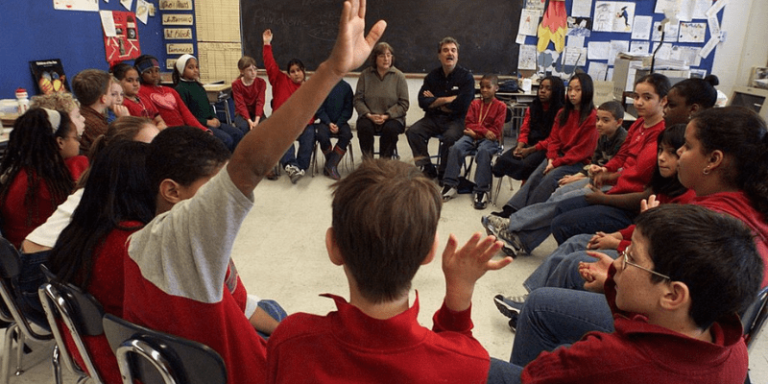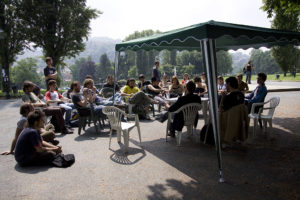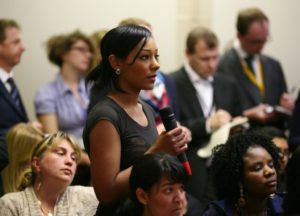Free Expression on Campus – A Right for All Students
This Constitution Day, the Campus Free Expression Project explored the issue of free speech for students.
By: Laura Valkovic | September 17, 2022 | 1167 Words

(Photo by Pat Greenhouse/The Boston Globe via Getty Images)
Constitution Day is here – an occasion for Americans to celebrate and learn about one of the nation’s founding documents. The US Constitution not only outlines how the country’s government works, but also the rights of its citizens. One of those rights is the ability for Americans to express themselves freely. The First Amendment enshrined the right to free speech into law – but even though Congress can’t legally limit Americans’ speech, many young people today find it more and more difficult to express their views.
Schools and colleges have become more political places, and many suggest that some viewpoints are being stifled in these educational environments. In student surveys, almost nine out of ten say that staff and students with a wide range of political opinions should be welcome on campus, and five out of six say that free speech rights are important to America’s democracy. However, many students report that they do not feel comfortable expressing their views and two-thirds say their campus climate stifles expression.

(Photo by Massimo Di Nonno/Getty Images)
To explore this issue, the Bipartisan Policy Center held a special Constitution Day event for student leaders to discuss free expression on college campuses. The Bipartisan Policy Center is a group that encourages cooperation between those who have differing opinions on politics, and who support different political parties. It runs the Campus Free Expression Project (CFEP), which “believes a free and open society depends upon the free and open exchange of ideas” and aims to promote free speech at colleges.
Unfortunately, according to the CFEP, “Two core principles of higher education—academic freedom and free expression—are undergoing a period of great stress.”
Promoting Free Speech on Campus

(Photo by JHU Sheridan Libraries/Gado/Getty Images)
Three student leaders got together with the CFEP to reveal their experiences and talk about what they’re doing to promote free speech at schools and colleges.
Cheyanne Rider is a student at Linn-Benton Community College and Oregon State University. She suggested that one way to keep communication open is to mix with people of different backgrounds, ages, and political views – rather than sticking to groups where everyone is similar. In an environment with people of diverse views, she said, “you kind of have this courage to speak your mind and share your opinion.”
Another panel member, Manraj Multani, is student at George Washington University. After arriving at college in 2021, he described the mood: “There was a lot of hostility, from what I’ve seen, within [students toward] each other. Some of them would have like a normal conversation, but the moment anything got just a little spicy [there was] immediate backlash on the other person. And I was just like, ‘this is such a negative environment.’”

(Photo by Gareth Fuller/PA Images via Getty Images)
When Multani noticed this problem among students, he started a BridgeUSA group at his campus. BridgeUSA is an organization run by students and young people that “creates spaces on high school and college campuses for open discussion between students about political issues.” The group helps students talk to each other about their views, no matter if they agree or disagree, because, it says, “Political division is one of our biggest challenges in the United States.” According to its website, “We don’t believe having strong beliefs is the problem; we believe the problem is how we express those beliefs. In fact, we believe disagreement provides the fuel for democracy to move forward.”
“Our core mission is for students to talk to one another, build leadership qualities, and most importantly … have empathy to one another,” Multani added.
Self-Censorship
People often talk about censorship – when the government stops people from saying certain things – but what about the limits we put on ourselves? Self-censorship is a common experience for young people today – whether they are worried about what their peers will think, or their teachers giving them a bad grade because of their opinions. According to the CFEP, students and teachers both report self-censoring. One survey found 63% of students agreed that “the climate on my campus prevents some people from saying things they believe because others might find them offensive,” a number which has risen in recent years.

“In terms of people being afraid to speak out on campus, it’s very common,” said Manraj Multani. “People are just worried about their reputation, worried about how their friends see others … But, in spite of all that, it’s just important … for people to step up and be like ‘hey, that’s wrong.’”
Social Media
According to CFEP, 58% of undergraduate college students say that they mostly discuss social and political ideas on social media, rather than face-to-face – but only 32% say those conversations are usually respectful.
Megan Bahr, a pupil at the University of Wisconsin-Parkside, commented on the difference between online conversations and talking in person:
“[Social media] helps in some ways, it doesn’t help in other ways. It’s easier to say things about people when you’re behind a screen and not face-to-face, so that difference is definitely big. I would say social media is definitely helping people get more connected and feel more included because people can create communities over social media, but I think when it comes to discussion and people disagreeing and agreeing [with] each other and having open conversation, I think having discussion face to face is much, much better.”
Multani suggested that social media has advantages and disadvantages for political discussion, but also noted that it can provide a platform for students to show they are willing to talk: “If we can show students and … adults and faculty, teachers, professors, that students are willing to talk on campus, we just need a platform to do it, and one where students aren’t afraid of people trying to cancel them or – actually have people agree or disagree. I mean the purpose of [BridgeUSA], it isn’t to reach a ‘common ground’ on specific issue, like some sort of solution. It’s for people to talk about their issues and have the other side like realize why believe in whatever their beliefs are.”
Preserving a Fundamental Right
Free speech was one of the very first rights the Founders added to the Constitution – and it is still a key part of what it means to be an American. But rights need to be constantly used and fought for, or they can easily slip away – something that today’s young people are feeling in their own lives. By making an effort to openly express their opinions and discuss issues with all kinds of people – no matter if they agree or disagree – students can work to preserve the fundamental right to free expression. As Bahr said, “I think college is all about having an open mind of whether you agree or disagree [with] something or not.”
















